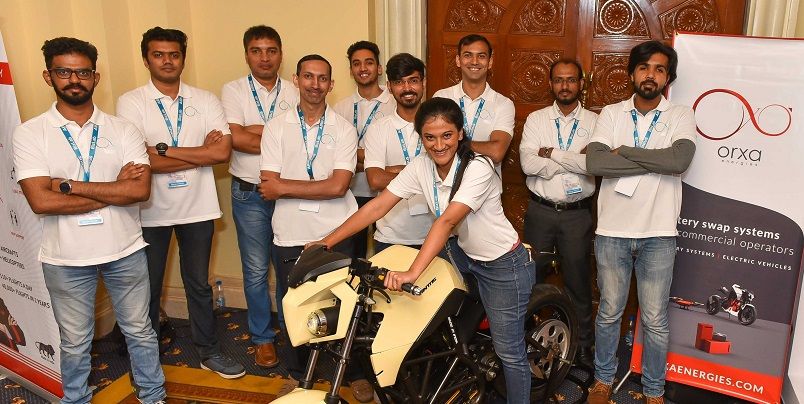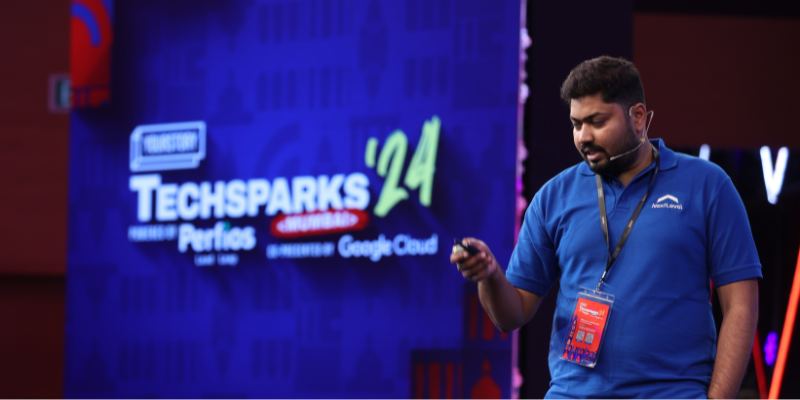Orxa is revving up to roll out an electric superbike and ensuring that charging it won't be a problem
Bengaluru-based Orxa Energies is getting ready to launch Mantis, India’s first electric super street bike. It says that battery swapping can help tackle biases against EVs when it comes to concerns about up-front costs, range, charge time, and charging infrastructure.
From their unit in the industrial suburb of Rajajinagar, Bengaluru, entrepreneurs Ranjita Ravi and Prajwal Sabnis, a husband-wife duo, are readying to change the world, one battery at a time. Their startup, Orxa Energies, is building an electric super bike that uses swappable batteries. But the bigger plan is to create a “swappable battery ecosystem” that can take India’s electric vehicle (EV) industry to the next level.
And while naysayers may say that it’s difficult to build an electric performance bike from India, the duo has already got the likes of Airbus taking them – and their product - seriously.

Orxa Energies aims to design and build powerful, long-range electric motorbikes and trikes. It’s first offering, Mantis, is India's first fully-electric entrant in premium motorbike market. The Mantis, named after the “slender ambush predator”, is not a regular electric bike. The elegantly designed, powerful performance bike has a range of 200km and a top speed of 140km-plus, translating into pure acceleration and no lag because of moving parts (no gears).
Apart from the bike, which will be launched in late 2019 or early 2020, they are building batteries and electric vehicle subsystems. in this case, battery management systems. All products are designed and built in-house, but manufacturing is outsourced. Orxa has no plans to get into infrastructure right now.
Getting started
The Orxa founders come from rich academic backgrounds. Prajwal holds a PhD from Mines Paris Tech and has an MS from Stuttgart University. After his studies in Europe, he returned to his home town, Bengaluru, and was struck by the rapid urbanisation and pollution. He worked in the aerospace industry for a couple of years but realised he wanted to “do more” with his engineering skills.
In 2015, he started up Orxa Energies with his wife, Ranjita, who has an MBA from ESSEC Business School, Paris, has worked for more than 10 years in sales, marketing, and internal audits. When Prajwal started up, Ranjita worked on developing the business and setting up in-house processes.
“Initially, we thought we could manufacture here. Like many other hardware startups, we started off with an over-confidence on what can be achieved within the vast Indian ecosystem. But slowly, realisation hit us about the extent of detailed engineering needed to bring out a quality product – something that we (ourselves) would want to ride,” Prajwal admits.
In late 2015, the co-founders realised that very few people had done anything completely new when it came to original, sporty electric bikes; most had only worked on minor iterations of parts designed, approved, produced, and sold elsewhere in the world.
Also read: SUN Mobility joins hands with SmartE to set up battery swap stations for e-vehicles

There were problems with suppliers as not many in India were geared to work with small hardware startups. “Everyone was ‘optimised’ to work with players whose minimum order quantities (MoQs) were in tens of thousands. Any potential supplier, be it a single guy operating out of a 500 sq ft office to a massive company with a large factory, was geared for bulk production orders,” Ranjita says.
For a while, they considered importing batteries, micro-controllers, and frames from China. But there would be no guarantee of quality and no hope of after-sales service.
What differentiates Orxa
Orxa began to cherry-pick subsystems “very early and very consciously”. The founders decided to develop their expertise in subsystems, which is what they have been working on since 2016. Building sub-systems, such as the entire battery management system, let them work with suppliers and scale up as sub-systems can be sold to anyone wanting to work in the EV space.
Clients for swappable batteries would include large automotive corporates aiming to launch electric vehicles that need to have the battery cost built into the car’s cost of production. Orxa’s battery packs are already being sold, but the startup does not want to disclose client names yet.

“Our battery packs are now clocking sales, with pilots in execution. Our automotive packs are off-the-shelf, swap-ready, and modular. These packs have a greater power output, at lower weights, with advanced, proprietary thermal management. We believe in chemistry ‘agnostic’ battery systems,” Prajwal says.
“In a way, you can say that we’re solving each problem of the EV value chain sequentially, and offering each solution as an offering to our clients,” Ranjita says.
Orxa was part of Airbus accelerator BizLab last year, and the European aerospace corporation connected it to its ecosystem of vendors who would want battery technologies. “The mentors helped us refine our approach to some of the challenges, and the accelerator connected us to the right people within the Airbus ecosystem,” Prajwal says.
The bike and the battery
Orxa’s first vehicle, the Mantis, is designed as an early-performance street bike. The three wheels offer stability, safety, and comfort while the tilt-and-steer mechanism makes city riding easy.
“We aim to deliver design, ride pleasure, and performance. The speeds and range will allow our riders to be comfortable on all types of city roads and on highways, while the battery-swap option opens up the scope of electric biking,” the founders say.

Also read: Shreyas Shibulal’s Micelio all set to fund EV startups with a corpus of Rs 140 Cr
The company, which employs 14 people, has a prototype that is being tested on the streets for the last 12 months. The company, which refused to share investment and pricing details, aims to sell the Mantis on online channels by 2020.
Orxa’s offering will come up against Pune-based Tork, which is working on an electric bike for daily commutes, and Bengaluru-based Ultraviolette, which aims to launch its electric bike by the end of the year. Bengaluru-based Ather Energy also manufactures two electric scooter models, and has set up an electric vehicle charging infrastructure. Ather, which has the only electric scooter in production, has raised a strategic round of funding, of Rs 200 crore, from Hero Moto Corp.
However, Ranjita and Prajwal believe their competition comes from traditional, fuel-based vehicles.
Riding into the future with battery swapping
Orxa wants to go further than its vehicles can take it; it is keen to provide the transportation industry with battery solutions and also charge for energy storage and distribution.
The battery tech segment has different camps as of now. The combinations include batteries, super-capacitors, lithium, non-lithium, hydrogen, sodium, and silicon. It’s clear that lithium is not going away in the near future. And that the Indian ecosystem has a long way to go when it comes to good quality Li-cell R&D and Li-cell manufacturing before Indian battery tech can be globally competitive.
India’s market for EV batteries alone could be worth as much as $300 billion from 2017 to 2030. Lithium battery pack prices are expected to fall from $200 per kWh to under $100 by 2025.
BNEF first started tracking EV battery prices back in 2010, when average battery pack prices were $1,000/kWh. Fast forward to the end of 2017 and average prices hit a low of $209/kWh, a remarkable 79 percent drop in seven years. The average energy density of EV batteries is also improving at around 5-7 percent per year.
“However, as India is a price-sensitive market, the customer expectation on battery pack pricing is still challenging,” Ranjita says.
Orxa’s competitors are also eyeing the battery business and building their own subsystems. Ather and Tork are going the way of a plug-in battery while Ultraviolette is working on swappable batteries.
The founders say battery swapping will tackle biases of up-front cost, range anxiety, charge time, and charging space. Battery swapping stations function like battery aggregators; they let a third party take ownership of the battery and replace drained batteries with charged ones.
“We believe that battery swapping is a win-win for rapid electrification of two-wheeler and three-wheeler transport - especially shared mobility in India, where minimal vehicle down time is a critical factor,” Ranjita says.
Also read: How technology is strengthening the future of EVs in India











